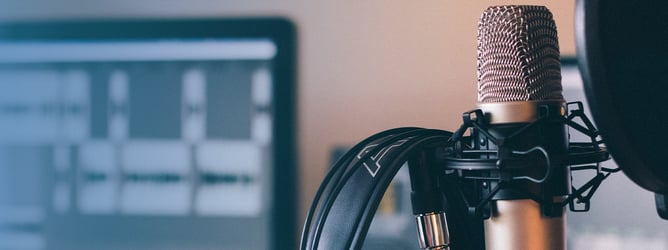
Podcasts are so common these days they’ve become a cliché. But things typically become clichés after they have developed into powerful truths, and podcasts have proven no exception to that rule. They can be an excellent way to connect with new audiences, increase brand engagement, or position your organization as an industry thought leader.
However, if you’re new to the technical side of podcasting, you may be wondering: “How do I start a podcast?” Or — “Should I start a podcast?”
As PRI’s in-house podcast producer, I’m here to offer my best tips to help you answer these questions (and more).
Who Should Start a Podcast?
Before you begin a podcast, you should research whether the effort is worth the return, or if you will you just be a blip in an oversaturated market. Ponder the purpose of your podcast, and ask yourself the following questions:
- Who or what will the podcast represent? A person, brand, lifestyle, or fandom?
- Will your podcast stand alone, or will it supplement a pre-existing entity? (For example, The New Yorker Radio Hour supplements The New Yorker magazine, and The Problem With Jon Stewart Podcast augments the new Apple TV show by the same name.)
- What is the goal of your podcast? To make money? Gain clout? Connect more deeply with an existing audience?
- Who is your target audience? Who is the average listener, and what is their ideal user experience?
Answering these questions is fundamental to measuring the success of your podcast, as well as to making sure your messaging and tone serves your purpose and your audience.
What Makes Your Podcast Unique?
Once you know what you want to bring to the market and who your audience is, you can begin thinking about your competitors. Remember, your greatest competition may not even be another podcast. YouTube and Twitch channels may be serving up similar content, and you need to understand how to set yourself apart.
As you conduct market research and identify potential competitors, don’t turn away — consume their products! Make notes of what others are doing right and what they’re doing wrong. Recognize that their format may currently work for your intended audience; if that’s the case, you’ll have a great launching pad to ideate on ways to set your podcast apart. It’s always helpful to talk to your friends and colleagues in the field to gauge how the format feels to them, as potential consumers.
What Makes a Good Podcast Host?
Have you decided on a topic for your show? A goal? An angle that will set your podcast apart? That’s great!
Next, consider your host or hosts — and keep in mind that being a podcast host is no easy feat. It requires someone who’s a great conversationalist, who can be charismatic and confident without sounding overzealous or cloying. No one likes to hear the robotic reading of a script, so your host will need to guide conversations to help things feel natural and to make any guests feel at ease. When choosing a host for your podcast, consider the following questions:
- Can they carry your podcast through multiple seasons?
- Do they have a voice people want to hear?
- Will they be able to achieve a “Goldilocks” style of speaking (not too much, not too little)?
- Can they respond in a dynamic way to accommodate guest responses or questions?
What Equipment Is Needed for a Podcast?
Next, let’s get down to the brass tacks of podcasting: the equipment and technical stuff. Your list may vary a bit, but there are a few things you will absolutely need:
- A strong and stable internet connection. Does your WiFi not cut it? Try a hardline connection. If that’s still no good, you should seriously consider upgrading or changing your internet service before undertaking a podcast. You will be saving yourself a lot of time and frustration down the line.
- A quiet room. This may seem obvious, but it cannot be overstated enough. Turn off your fans, air conditioners, and heaters. Keep your pets and family members far from your recording space. Can you hear construction noise or kids playing outside? That’s not the room for you. Don’t forget to turn off your phone and desktop notifications as well!
- Recording software. You can use a Zoom or Skype account with recording access, but the audio quality won’t be very good. If you’re only recording yourself, I recommend using Adobe Audition (which can also be used to edit your audio into an episode). If you have guests, you might want to look into something that isolates each of your audio streams, like Zencastr.
- An external microphone. Laptop mics do the bare minimum here, but for a professional podcast I highly recommend investing in a quality external microphone. (This should NOT be a headset.) It will make your audio clear and your podcast will sound much more polished.
Who Will Edit Your Podcast?
Another important factor to consider is who will be editing your podcast. Many podcast beginners do this themselves, and that is a totally viable option! There are plenty of software solutions that can help you edit your audio. But if you don’t have previous experience editing audio, I strongly recommend getting a dedicated editor. This will help you keep your podcast on a consistent schedule in case you get wrapped up in other aspects of the project. It will also prevent you from spending countless hours tweaking audio levels and working on other time-consuming (but important) minutiae.
How to Distribute Your Podcast
Once you have your podcast recorded and edited, how will you distribute it to the world? This step can get a little tricky. First, you’ll need to create an RSS feed that will serve as the distribution connection for your podcast.
Why do you need an RSS feed for your podcast?
RSS feeds aren’t just important for podcasting. They’re essential. Your RSS feed will contain all the necessary info about your show — like the name, description, and artwork — so that podcast directories can automatically display your info and episode updates, and so listeners can subscribe and listen from their streaming platform of choice.
Once you’ve established your RSS feed, you can publish your podcast across multiple channels such as Apple Podcasts and Spotify. All of this manual publishing can be quite a hassle (especially if you’re doing a weekly podcast), so I recommend investing in a podcast publishing platform, such as Libsyn, to release your content. Podcast publishing platforms will allow you to distribute to all the major podcast streaming services all at once, saving you a lot of time!
Finally, don’t forget to create an SEO-optimized website or landing page, which will allow your audience to find you more easily through Google or Bing.
Finding a Production Partner for Your Podcast
Do you really need all of this to start a podcast? If you want it to be a successful one, yes! But you don’t have to go it alone. Some podcasts partner with production companies to help them edit and release their show; however, these companies typically offer little help in the way of content creation and marketing.
As a technical partner, PRI can help launch and manage all aspects of your podcast (just as we’ve done with the American Payroll Association’s podcast PayTalk). Our services include everything from format ideation and content creation to podcast hosting, editing, distribution, and marketing strategy and execution.
Think the team at PRI can help you get your podcast ball rolling? Interested in learning more about your options? Reach out today!







